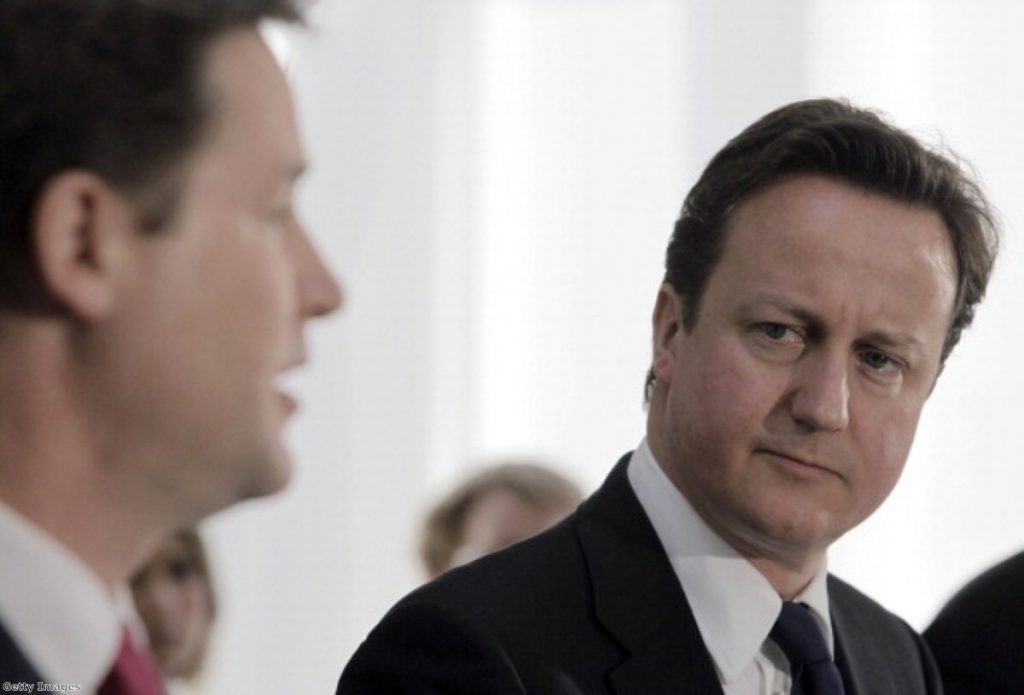Sketch: You can’t always get what you want
David Cameron urgently needs to win back his jilted coalition partner but Nick Clegg will want more than a Stones serenade if he's to return.
By Alex Stevenson Follow @alex__stevenson
There were two gaping holes in the Commons this afternoon. One was the space to David Cameron's right, which should have been occupied by the deputy prime minister. The other was Labour's position on whether it, too, would have vetoed the EU deal.
Miliband didn't turn up to the big political event of the day with a position on Europe, but Nick Clegg didn't bother turning up at all.
After a weekend of moaning about the prime minister's decision, which Nick Clegg has claimed left Britain in rather a bad position, the deputy PM was nowhere to be seen when it came to game time. Cameron did his best to gloss over the gap on his frontbench, but that didn't prevent Miliband spotting it. "We all note the absence of the deputy prime minister from his place," he said, by way of an opening gambit. Manic chess grand masters may have advanced their first pawn with less relish of the massacre ahead, but it seems unlikely.
Miliband, like every other MP in the packed chamber, was thoroughly over-excited. But unlike most backbenchers, who revert to the mindset of a five-year-old upon the slightest stimulation, he can always do with a bit of extra energy. "Oh! Oh! Oh!" he cried, after trapping Tory MPs into criticising Michael Heseltine. "No, Mr Speaker!" he yelped a little later. "I haven't finished with him yet!" Cameron flung himself back on the benches, red-faced, clapping his hand theatrically on his forehead.
It was an excellent performance, an inversion of the regular Miliband template. Usually the Labour leader has the right arguments but lacks the panache to deliver a killer blow. This afternoon it was the opposite: all style, but no position. Would he have vetoed the treaty, or not? "If you can't decide," Cameron said, taking five seconds to demolish the leader of the opposition's ten-minute assault, "you can't lead!"
With Miliband dealt with, Cameron was free to bask in the welcome if unusual glow of approval emanating from his backbenches. "May I declare my admi-waytion," Sir Peter Tapsell burbled. He was the first in a parade of unusually cheerful Conservative grouches. They even praised Cameron's "bulldog spirit". The PM had a peculiarly gleeful look on his face when he heard that.
Liberal Democrat MPs, who despite much practice are still not very good at hiding their discomfort in the Commons chamber, took a lot of flak from both sides of the House. They were taunted by Labour MPs whenever the PM suggested any kind of unity. They were roasted by Tory eurosceptic diehards including Nadine Dorries, Bill Cash and Mark Pritchard, who pointed out 49% of Lib Dem voters backed the prime minister. Peter Lilley went furthest, hissing that the best thing to do was always "to set out one's position and stick to it!" It was the sort of familial contempt that only a long period of enforced close proximity can engender. The coalition marriage has stabilised into a stage of mutual, simmering hatred.
This afternoon Lib Dem MPs assumed an odd sort of huffiness at which Miss Piggy would have humphed her approval. Martin Horwood raised a New York Times article suggesting the City was more at risk now than it had been before. Jo Swinson said that constructive approaches were generally a better strategy than just "rushing for the exit". Bob Russell, offering what Cameron called "grandfatherly advice", suggested that the PM "abandon the Carlos Tevez approach".
Cameron said he would give that last one some thought. Russell looked surprised: this may be the first time the prime minister has ever really paid attention to his views.
But then the PM was in conciliatory mood. He was keen to compliment the Lib Dems for rolling over so effectively on so many issues, rather than criticise them for having different ones. "In a coalition," he explained in a kindly tone, "parties cannot achieve everything we want to achieve".
I couldn't spot a single MP on the government benches who liked the sound of that. He may as well have tried singing 'You Can't Always Get What You Want'. But then this is the new politics: a politics where the deputy PM can spurn the Commons on a key national occasion in what may be a suspiciously theatrical sulk. A year-and-a-half in, the fallout from last week's summit reminds us quite how odd coalition politics can be.





-01.png)